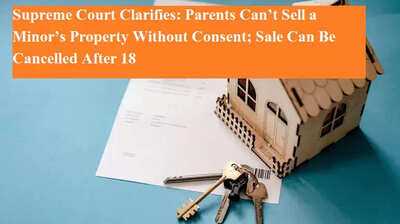The Supreme Court has ruled that once a child turns 18, they can revoke the sale or transfer of their property made by parents or guardians without court approval.
Supreme Court’s Landmark Judgment on Minors’ Property RightsIn a significant ruling, the Supreme Court of India has held that parents or guardians have no absolute right to sell or transfer a property registered in the name of a minor. Once the child attains adulthood, they are legally entitled to cancel such a transaction — even without filing a formal lawsuit. The court clarified that a clear and decisive action by the adult, such as selling or transferring the property themselves, is sufficient to invalidate the earlier deal.
This landmark judgment has major implications for property transactions involving minors and reinforces the protection of their ownership rights under Indian law.
Case Origin: A Dispute from Karnataka’s Shamanur VillageThe case that led to this ruling traces back to a long-standing property dispute from Shamanur village in Karnataka.
In 1971, a man named Rudrappa purchased two plots in the names of his three minor sons. Later, without obtaining permission from the court — which is mandatory under the Hindu Minority and Guardianship Act, 1956 — he sold those plots to another party.
Years later, after the sons became adults, they sold the same plots to another person, K.S. Shivappa. This led to a legal tussle between the first buyer and the subsequent owner, with both parties claiming rightful ownership of the land.
The dispute eventually reached the Supreme Court, which had to determine whether the sale made by the father during the sons’ minority was legally valid and if the now-adult children could challenge it.
Supreme Court’s Key ObservationsThe apex court clarified that minors have an inalienable right over property registered in their names. Parents or guardians cannot transfer or sell such assets without prior approval from a competent court. If they do, the transaction remains voidable at the minor’s discretion once they reach the age of majority.
Importantly, the court also noted that filing a formal lawsuit is not mandatory to cancel such a transaction. A person can simply take a clear action to assert ownership — for example:
-
Selling or transferring the property themselves after turning 18.
-
Publicly rejecting or disputing the earlier sale.
-
Taking possession or control of the property to assert their rights.
The Supreme Court reasoned that minors often have limited awareness of property transactions conducted in their names, and in some cases, they may already possess the property. Hence, demanding a formal legal process every time would be unreasonable.
Different Views in Lower CourtsThe ruling brings much-needed clarity, as lower courts had previously expressed conflicting opinions on whether filing a lawsuit was necessary to cancel an unlawful sale of a minor’s property.
Some courts believed that only a civil suit could nullify such a transaction, while others accepted that an adult’s direct actions — such as taking ownership or selling the property — were sufficient proof of cancellation.
By siding with the latter interpretation, the Supreme Court has now established a uniform legal precedent across India.
Implications of the VerdictThis judgment strengthens property rights for minors, ensuring they remain protected from unauthorized actions by guardians. It sends a clear message that parents or legal guardians cannot unilaterally sell a minor’s property without judicial approval.
Moreover, once the minor becomes an adult, they hold full authority to decide whether to retain or revoke that transaction. The decision also simplifies the process by eliminating the need for a lengthy court battle in certain cases, provided the adult takes clear steps to reclaim or manage their property.
ConclusionThe Supreme Court’s decision in the Shamanur property case reinforces a crucial legal principle — the rights of minors over their property remain intact until they choose otherwise after adulthood. Parents and guardians must act responsibly, ensuring transparency and legal compliance in all property-related dealings.
This ruling not only safeguards minors from potential exploitation but also ensures that their property rights are honored, recognized, and protected by law throughout their lifetime.
You may also like

A profitable deal for farmers, this scheme offers a 50% discount on farming equipment; apply quickly.

Max Verstappen at odds with Helmut Marko as Red Bull ace denies close ally's comments

Mirra Andreeva denied WTA Finals debut after 'visa' drama as Elena Rybakina swoops in

Every F1 driver replaced at Mexican Grand Prix including Lewis Hamilton and Max Verstappen

Haryana taking steps to become electronics manufacturing hub: Chief Secretary







